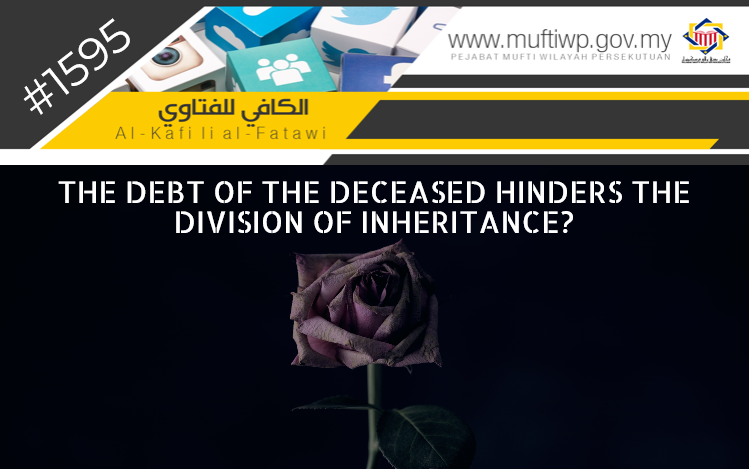Question:
Assalamualaikum SS Mufti. Here, I have a question about the inheritance left by a deceased. My question is, is the inheritance left by a deceased immediately become the property of the heirs or after all the debt of the deceased have been settled? Hope for an explanation from you. Thank you.
Answer:
Waalaikumussalam. Alhamdulillah, praise and thanks to Allah for the countless blessings He has blessed us all with. Blessings and salutations to the Prophet Muhammad PBUH, his wives, his family, companions and all those that follow his teachings to the day of judgement.
We will start with the statement of Allah SWT:
لِّلرِّجَالِ نَصِيبٌ مِّمَّا تَرَكَ الْوَالِدَانِ وَالْأَقْرَبُونَ وَلِلنِّسَاءِ نَصِيبٌ مِّمَّا تَرَكَ الْوَالِدَانِ وَالْأَقْرَبُونَ مِمَّا قَلَّ مِنْهُ أَوْ كَثُرَ نَصِيبًا مَّفْرُوضًا ﴿٧﴾
“For men is a share of what the parents and close relatives leave, and for women is a share of what the parents and close relatives leave, be it little or much - an obligatory share.”
Surah al-Nisa’ (7)
Also, the words of the Prophet PBUH:
«أَلْحِقُوا الفَرَائِضَ بِأَهْلِهَا، فَمَا تَرَكَتِ الفَرَائِضُ فَلِأَوْلَى رَجُلٍ ذَكَرٍ»
"Give the Fara'id (the shares of the inheritance that are prescribed in the Qur'an) to those who are entitled to receive it; and whatever is left should be given to the closest male relative of the deceased."
Sahih al-Bukhari (6746) and Sahih Muslim (1615)
According to both of these evidences; the Quranic verse and the hadith of the Prophet PBUH, it can be understood that the inheritance left by a deceased will be divided to the rightful heirs after the management and settlement of the funeral, debt and will or bequeath (if the deceased has made any will or bequeath) of the deceased.
Coming back to the question asked, regarding the ownership of the inheritance of the deceased. Does the ownership immediately change to the heirs after the death or after the debt of the deceased have been settled? This matter is closely related to a statement of Allah SWT:
﴿مِنْ بَعْدِ وَصِيَّةٍ يُوصِي بِهَا أَوْ دَيْنٍ﴾
“(The division is) after any bequest he [may have] made or debt.”
Surah al-Nisa’ (11)
Thus, here, scholars have differing opinions about it. The opinions of scholars are divided into two:
- First opinion: The ownership of inheritance does not change to the heirs but remains as the deceased until all of his debts are settled. This is the opinion presented by Abu Sa’id al-Istokhri (أبو سعيد الإصطخري)
Thus, if there are any benefit or dividend from this property, then it is bound with the rights of ghurama’ (a person in debt) for if a property is sold then this agreement is with the deceased not the heirs. Thus, the ownership remains with the deceased.
- Second opinion: The ownership of the inheritance changes to the heirs immediately after the death. And this is the opinion held by all scholars of madhhab Syafie.
Thus, any benefit resulting from it (the inheritance) is not bound to the rights of ghurama’. The reason is, answering to the first opinion if it is still owned by the deceased, then it means anyone (from the heirs) that dies before the debt is settled (the debt of the deceased) cannot inherit the inheritance from the deceased.
(See al-Majmu’ Syarh al-Muhazzab; 16/49)
Hence, it is clear that the ownership of the inheritance left by the deceased would immediately change to the heirs after the death. Then, it also means that the debt of the deceased does not hinder the inheritance. This is strengthened with the words of Imam al-Syirbini in his book:
الْأَصَحَّ أَنَّ تَعَلُّقَ الدَّيْنِ بِالتَّرِكَةِ لَا يَمْنَعُ الْإِرْثَ، وَإِنَّمَا يَمْنَعُ التَّصَرُّفَ فَتَكُونُ التَّرِكَةُ بِكَمَالِهَا كَالْمَرْهُونَةِ بِالدَّيْنِ وَإِنْ قَلَّ
The sahih opinion in madhhab Syafie states that the debt of the deceased that is bound to the inheritance left by the deceased does not hinder the inheritance, however, it blocks it from being spent, thus all of it (the inheritance) is akin to collateral or pawned property due to the debt even when it is of a small amount. (See Mughni al-Muhtaj; 4/8, al-Mu’tamad fi al-Fiqh al-Syafi’i; 4/347-348)
Through this statement, we can understand that although the debt of the deceased does not hinder the inheritance process, however, the heirs are prevented from spending or benefitting from it as long as the debt hasn’t been settled. Thus, it is compared to a collateral or pawned property.
Closing
To conclude, when a person dies, the ownership of his inheritance immediately changes to the heirs and the debt of the deceased does not hinder nor prevent the inheritance process. However, it prevents the inheritance from being spent or used by the heirs and it is compared to a pawned property. Lastly, may Allah SWT give us the right understanding in this religion, firm our faith and bless all our deeds.
Wallahua’lam.


